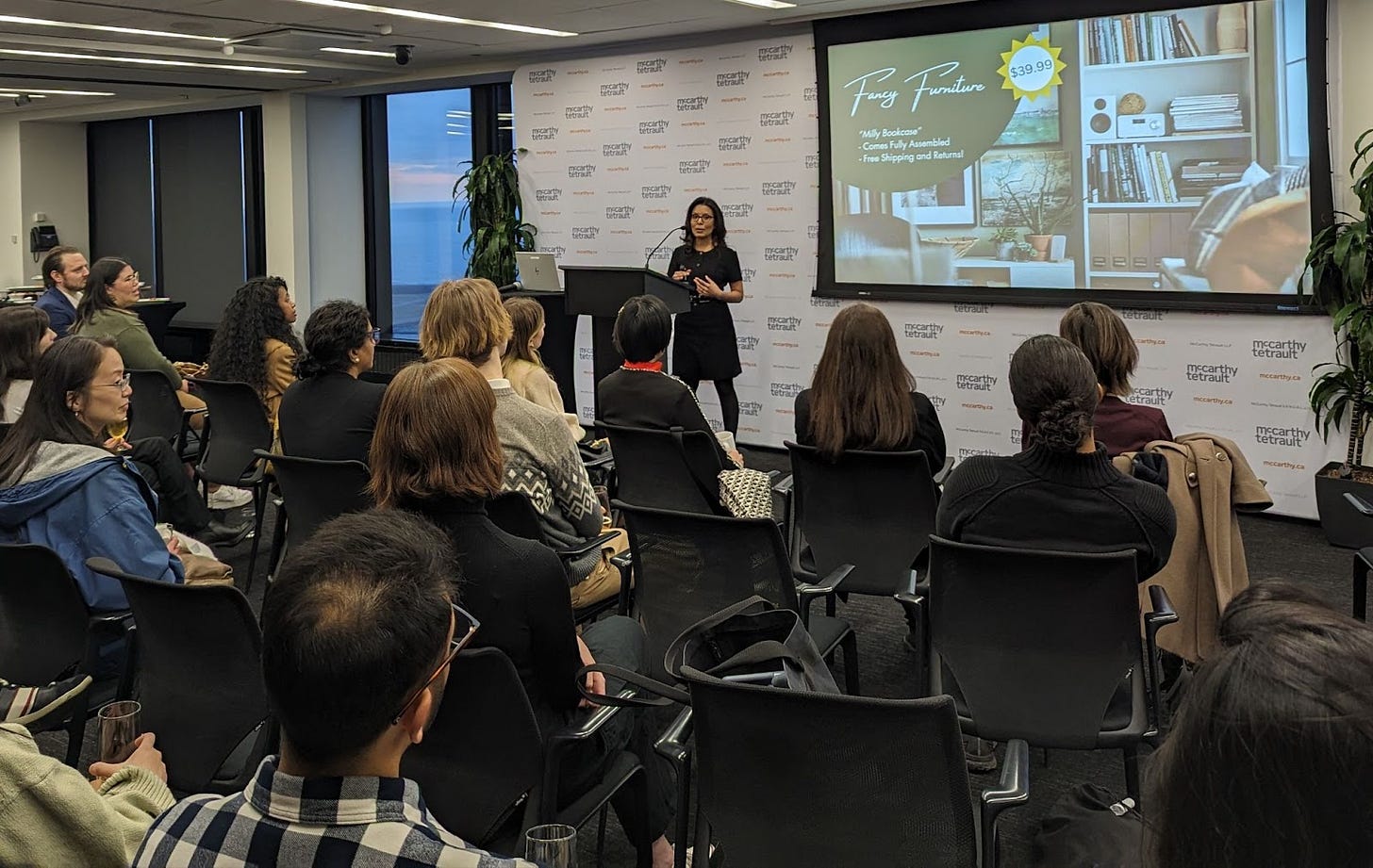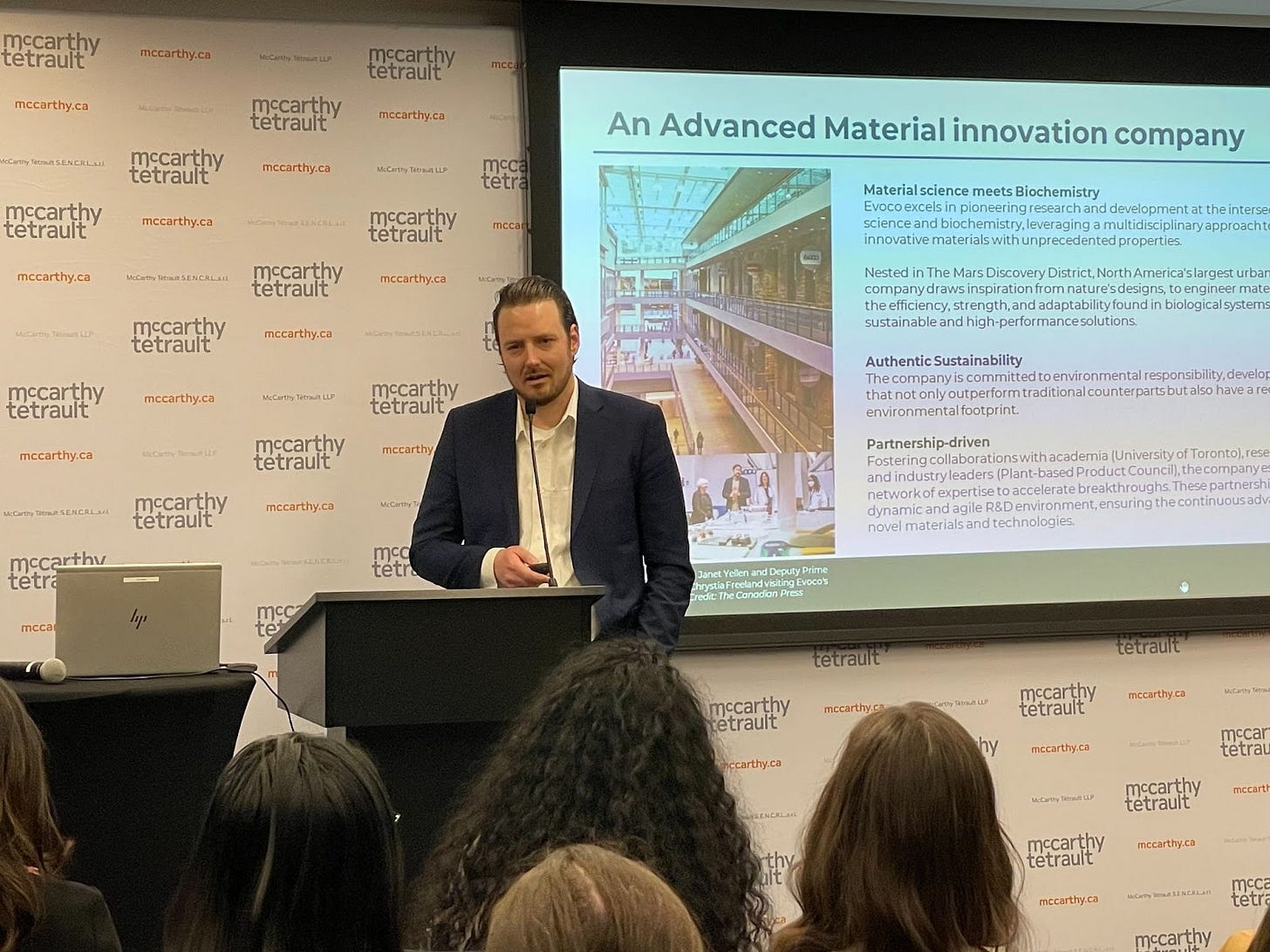Renewable Runway: Unveiling Tomorrow’s Sustainable Trends with Style
Steering the fashion world towards more greener practices
Another month brings another remarkable evening with a stellar lineup of speakers. We extend heartfelt thanks to the Climate North community for their enthusiastic participation and steadfast support of Toronto’s burgeoning sustainable ecosystem. Special appreciation goes to our speakers Deborah King, Gérald Alvoët, and Stephanie Lipp for sharing their valuable insights and success stories. Additionally, we give a shout-out to Albert Lin and McCarthy Tétrault for their generous sponsorship of this event.
📜 ECO-ELEGANCE VERIFIED
Certifications: The Guiding Light for Conscious Consumers
Certifications are crucial in navigating the complex landscape of sustainable fashion, offering consumers a reliable benchmark to make informed choices.
Certification as a Compass:
Organisations like Global Measure Inc., under Deborah King's leadership, epitomises the pivotal role of certification bodies in the sustainable fashion realm, ensuring brands meet rigorous standards of environmental and social responsibility.
Key Points:
According to a McKinsey report, The sustainable fashion market is burgeoning, projected to escalate from $6.35 billion in 2019 to over $8 billion by 2023, underscoring the sector's robust growth and consumer interest.
Geneva Environment Network suggests that a significant shift in consumer behaviour shows an increased demand for transparent and ethical fashion practices. Studies suggest that 60% of consumers are willing to pay more for sustainably made products.
Certification bodies validate the environmental and ethical commitments of fashion brands, offering consumers a trustworthy guide to making responsible choices.
Why it Matters:
Certified brands often witness increased consumer preference and market share.
Certifications like those from Global Measure Inc. are essential in steering the fashion world towards more sustainable practices, influencing consumer behaviour, and setting a precedent for the industry's future.
👟 SUSTAINABLE STRIDES
Stepping into the Future: The Rise of Bio-based Footwear
Main Idea:
Bio-based materials are revolutionizing the fashion industry, replacing synthetic, petroleum-based substances with sustainable alternatives.
EVOCO exemplifies this shift, with its plant-based solutions reducing carbon footprints significantly.
Why Should We Care:
Sustainable materials can drastically lower the industry’s environmental impact:
EVOCO’s FATESTM products boast up to 70% lower greenhouse gas emissions compared to traditional materials.
Rising consumer demand for eco-friendly products shows a shift in preferences, with 60% of Canadians willing to pay more for sustainability.
The Big Picture:
The Total Addressable Market (TAM) for sustainable footwear, which includes bio-based materials, is substantial and growing.
As of 2023, the global sustainable footwear market is valued at approximately USD 8.46 billion and is projected to reach USD 12.96 billion by 2030, growing at a compound annual growth rate (CAGR) of 6.2% (Grand View Research).
Additionally, the market is expected to rise from USD 9.59 billion in 2023 to USD 17.18 billion by 2033, at a CAGR of 6% (FM insights).
Bottom Line:
Bio-based materials are crucial for a sustainable fashion future.
EVOCO's strides in reducing emissions and pioneering plant-based technologies set industry benchmarks.
Adopting bio-based materials meets both environmental goals and consumer expectations.
Next Time You Shop: Action Items
Look for footwear with labels indicating use of bio-based materials.
Choose products certified for lower environmental impact, like those using EVOCO’s FATESTM technology.
If you’re a footwear brand looking to make strides towards a sustainable future, reach out to Gérald Alvoët, VP Marketing at EVOCO Ltd.
👜 FUNGAL FASHION
Mycelium Metamorphosis: Revolutionizing Fashion with Fungal Innovation
Unearthing Innovation:
Fungi-based materials like mycelium, the complex root system of fungi, are transforming the textile landscape, offering an eco-friendly alternative to traditional fabrics.
Companies like MycoFutures lead the charge, leveraging fungi's natural properties to create durable, sustainable materials that mimic leather and other textiles.
Fabric of the Future:
Sustainability: Mycelium is a renewable resource that can be grown quickly and efficiently, reducing the environmental impact compared to traditional leather production, which is resource-intensive and often involves harmful chemicals.
Biodegradability: Unlike synthetic leathers, mycelium-based materials are naturally biodegradable, reducing waste and pollution at the end of their lifecycle and contributing to a circular economy.
Versatility: Mycelium can be engineered to mimic the look, feel, and properties of traditional leather, while offering potential for customization and innovation in textures and finishes.
Global Canvas:
The fashion industry significantly impacts the environment, with synthetic fibres like polyester and nylon comprising 60-70% of textiles, leading to considerable greenhouse gas emissions and plastic pollution in oceans (Geneva Environment Network).
It is responsible for around 2.1 billion metric tons of greenhouse-gas emissions annually, equating to about 4% of the global total, similar to the combined emissions of France, Germany, and the UK (McKinsey & Company).
Mycelium offers a solution with its low resource requirements and biodegradability, reducing waste and pollution. Mycelium products by MycoFutures, lead by CEO & Co-Founder Stephanie Lipp, exemplify a paradigm shift in the industry, achieving a sustainable balance between functionality and environmental responsibility.
Zooming Out:
Mycelium-based businesses need support in several key areas to accelerate their entry into consumer markets:
Investment in R&D: Increased funding for research and development can help refine mycelium-based products, enhancing their quality, durability, and market appeal (StraitsResearch)
Collaboration with Industry Leaders: Partnerships with established fashion and material companies can facilitate knowledge sharing, scale production, and improve market access (GlobeNewswire).
Regulatory Support: Clear, supportive regulations and standards specific to mycelium-based products can streamline approval processes and boost consumer confidence.
💰GENEROUS SUPPORT
Thank you Albert Lin and McCarthy Tétrault for sponsoring our last event!
Albert Lin is the founder of DCarbonVC, a Canadian family office that invests globally in pre-seed to series A climate tech startups, leveraging over 50 years of infrastructure investment experience. They partner with founders, guiding them toward commercialization and institutional funding.
McCarthy Tétrault, with offices in Canada, New York City, and London, offers comprehensive legal services across business law, litigation, tax, real estate, and labour law, emphasising collaboration and tailored client outcomes. The firm excels in handling complex assignments for Canadian and international clients through its exceptional legal talent and industry expertise.
🗓️ UPCOMING EVENT
Keep an eye out!
We will meet again on April 30th to celebrate Earth Day!
So hold the date and stay tuned for more details!
🤝 ASKS
Climate North is small but mighty and we’re always open to any volunteer support. We are currently in need of support with:
Event photography (additional support - event rotation)
Speaker scouting
In-kind contributions
Location sponsorship
If you’re interested, please write to us at hello@climatenorth.com expressing which you would be interested in supporting us with.
Spread the word: Everytime you share this newsletter with your network or bring along a plus one to our events, you exercise your power of influence in making our world more sustainable. Thank you for putting your force behind us.
We’re built for our community, by our community.. Any help is appreciated :)
Thanks always for your participation and support! We’ll see you at the next event!
Rebeka (Becky) Romanovsky, Fab Barrillot, Chloe D'Agostini
Written by Tejas Shah
Pictures by Tejas Shah and Fab Barrillot









Great points on verification in the fashion industry, it's needed.
Many manufacturers in the built environment have been receiving 3rd party verifications from organisations like One Click LCA. Outputs include Global Warming Potential and Low Volatile Organic Compound declarations.
Let's hope leaders in the fashion industry do more to lower their impacts on the planet, and to educate consumers. If the construction industry can do it, so can the world of fashion.